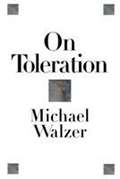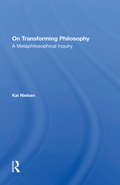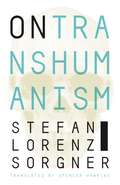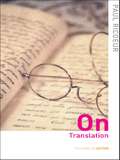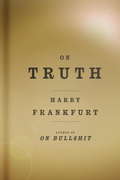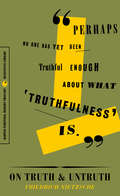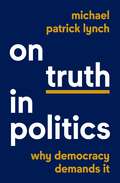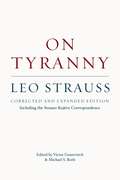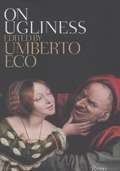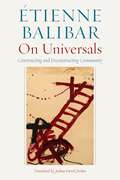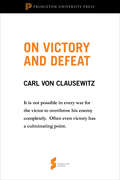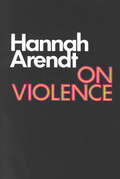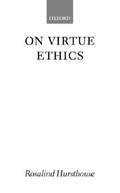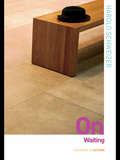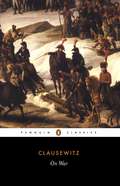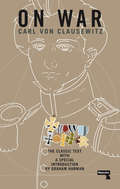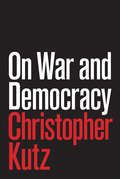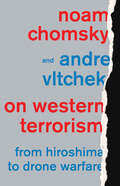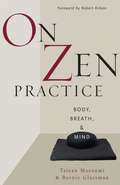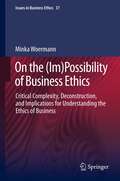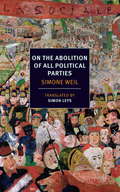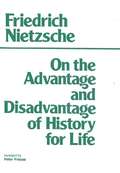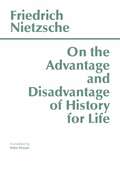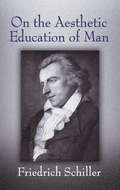- Table View
- List View
On Toleration
by Michael WalzerWalzer examines five "regimes of toleration" -- from multinational empires to immigrant societies -- and describes the strengths and weaknesses of each regime, as well as the varying forms of toleration and exclusion each fosters. He shows how power, class, and gender interact with religion, race, and ethnicity in the different regimes and discusses how toleration works, and how it should work, in multicultural societies like the United States.
On Transforming Philosophy: A Metaphilosophical Inquiry
by Kai NielsenWhen I first conceived of this book, I intended to write a short book and one, the great philosophical figures of the past and a few very eminent contemporaries aside, which made no reference to other philosophers and contained no quotations, footnotes and the like. I ended up doing neither. Indeed I went nearly to the exact opposite. I wrote a rather long book with, among other things, extensive discussions of my contemporaries and near contemporaries.
On Transhumanism
by Stefan Lorenz SorgnerTranshumanism is widely misunderstood, in part because the media have exaggerated current technologies and branded the movement as dangerous, leading many to believe that hybrid humans may soon walk among us and that immortality, achieved by means of mind-uploading, is imminent. In this essential and clarifying volume, Stefan Lorenz Sorgner debunks widespread myths about transhumanism and tackles the most pressing ethical issues in the debate over technologically assisted human enhancement.On Transhumanism is a vital primer on the subject, written by a world-renowned expert. In this book, Sorgner presents an overview of the movement’s history, capably summarizing the twelve pillars of transhumanist discourse and explaining the great diversity of transhumanist responses to each individual topic. He highlights the urgent ethical challenges related to the latest technological developments, inventions, and innovations and compares the unique cultural standing of transhumanism to other cultural movements, placing it within the broader context of the Enlightenment, modernity, postmodernity, and the philosophical writings of Nietzsche. Engagingly written and translated and featuring an introduction for North American readers, this comprehensive overview of the cultural and philosophical movement of transhumanism will be required reading for students of posthumanist philosophy and for general audiences interested in learning about the transhumanist movement.
On Transhumanism
by Stefan Lorenz SorgnerTranshumanism is widely misunderstood, in part because the media have exaggerated current technologies and branded the movement as dangerous, leading many to believe that hybrid humans may soon walk among us and that immortality, achieved by means of mind-uploading, is imminent. In this essential and clarifying volume, Stefan Lorenz Sorgner debunks widespread myths about transhumanism and tackles the most pressing ethical issues in the debate over technologically assisted human enhancement.On Transhumanism is a vital primer on the subject, written by a world-renowned expert. In this book, Sorgner presents an overview of the movement’s history, capably summarizing the twelve pillars of transhumanist discourse and explaining the great diversity of transhumanist responses to each individual topic. He highlights the urgent ethical challenges related to the latest technological developments, inventions, and innovations and compares the unique cultural standing of transhumanism to other cultural movements, placing it within the broader context of the Enlightenment, modernity, postmodernity, and the philosophical writings of Nietzsche. Engagingly written and translated and featuring an introduction for North American readers, this comprehensive overview of the cultural and philosophical movement of transhumanism will be required reading for students of posthumanist philosophy and for general audiences interested in learning about the transhumanist movement.
On Translation (Thinking in Action)
by Paul RicoeurPaul Ricoeur was one of the most important philosophers of the twentieth century. In this short and accessible book, he turns to a topic at the heart of much of his work: What is translation and why is it so important? Reminding us that The Bible, the Koran, the Torah and the works of the great philosophers are often only ever read in translation, Ricoeur reminds us that translation not only spreads knowledge but can change its very meaning. In spite of these risk, he argues that in a climate of ethnic and religious conflict, the art and ethics of translation are invaluable. Drawing on interesting examples such as the translation of early Greek philosophy during the Renaissance, the poetry of Paul Celan and the work of Hannah Arendt, he reflects not only on the challenges of translating one language into another but how one community speaks to another. Throughout, Ricoeur shows how to move through life is to navigate a world that requires translation itself. Paul Ricoeur died in 2005. He was one of the great contemporary French philosophers and a leading figure in hermeneutics, psychoanalytic thought, literary theory and religion. His many books include Freud and Philosophy and Time and Narrative.
On Truth
by Harry G. FrankfurtHaving outlined a theory of bullshit and falsehood, Harry G. Frankfurt turns to what lies beyond them: the truth, a concept not as obvious as some might expect. Our culture's devotion to bullshit may seem much stronger than our apparently halfhearted attachment to truth. Some people (professional thinkers) won't even acknowledge "true" and "false" as meaningful categories, and even those who claim to love truth cause the rest of us to wonder whether they, too, aren't simply full of it. Practically speaking, many of us deploy the truth only when absolutely necessary, often finding alternatives to be more saleable, and yet somehow civilization seems to be muddling along. But where are we headed? Is our fast and easy way with the facts actually crippling us? Or is it "all good"? Really, what's the use of truth, anyway? With the same leavening wit and commonsense wisdom that animates his pathbreaking workOn Bullshit, Frankfurt encourages us to take another look at the truth: there may be something there that is perhaps too plain to notice but for which we have a mostly unacknowledged yet deep-seated passion. His book will have sentient beings across America asking, "The truth—why didn't I think of that?" From the Hardcover edition.
On Truth and Untruth: Selected Writings (Harper Perennial Modern Thought Ser.)
by Friedrich NietzscheNewly translated and edited by Taylor Carman, On Truth and Untruth charts Nietzsche’s evolving thinking on truth, which has exerted a powerful influence over modern and contemporary thought. This original collection features the complete text of the celebrated early essay “On Truth and Lie in a Nonmoral Sense” (“a keystone in Nietzsche’s thought” —Stanford Encyclopedia of Philosophy), as well as selections from the great philosopher’s entire career, including key passages from The Gay Science, Beyond Good and Evil, On the Genealogy of Morals, The Will to Power, Twilight of the Idols, and The Antichrist.
On Truth in Politics: Why Democracy Demands It
by Michael Patrick LynchThe &“philosopher of truth&” (Jill Lepore, The New Yorker) shows why truth is an essential democratic value—and how it can be strengthenedDo any of us really care about truth when it comes to politics? Should we? In a world of big lies, denialism, and conspiracy theories, democracies are experiencing two interlocked crises: a loss of confidence in democracy itself and the growing sense among many that politics is only about power—not truth. In this book, Michael Patrick Lynch argues that truth not only can—but must—matter in politics. He shows why truth is an essential democratic value—a value we need to sustain our democratic way of life—and how it can be strengthened.Despite evidence that people are rarely motivated by truth when it comes to politics, On Truth in Politics argues that this isn&’t inevitable. Accessibly written and rigorously argued, it draws on the American pragmatist tradition to develop an original theory of the nature and value of truth in the messy world of politics. Contrary to the belief of many, political beliefs can be true or false. But if democracy is to continue to be a space of reason and not just an arena of power, we must build a better infrastructure of knowledge, including stronger schools and media, and renew our commitment to science and history.A vital and timely book, On Truth in Politics makes an original case for why democracy cannot survive without truth.
On Tyranny: Including the Strauss-Kojève Correspondence
by Leo StraussAn analysis of the classic Greek dialogue about absolute rule and the impassioned commentary it inspired between two philosophers.On Tyranny is Leo Strauss’s classic reading of Xenophon’s dialogue Hiero, or Tyrannicus, in which the tyrant Hiero and the poet Simonides discuss the advantages and disadvantages of exercising tyranny. Included are a translation of the dialogue from its original Greek, a critique of Strauss’s commentary by the French philosopher Alexandre Kojève, and the complete correspondence between the two.This revised and expanded edition introduces important corrections throughout and expands Strauss’s restatement of his position in light of Kojève’s commentary to bring it into conformity with the text as it was originally published in France.“On Tyranny is a complex and stimulating book with its ‘parallel dialogue’ made all the more striking since both participants take such unusual, highly provocative positions and so force readers to face substantial problems in what are often wholly unfamiliar, even shocking ways.” ―History and Theory
On Ugliness
by Umberto Eco Alastair McEwenIn the mold of his acclaimed History of Beauty, renowned cultural critic Umberto Eco’s On Ugliness is an exploration of the monstrous and the repellant in visual culture and the arts. What is the voyeuristic impulse behind our attraction to the gruesome and the horrible? Where does the magnetic appeal of the sordid and the scandalous come from? Is ugliness also in the eye of the beholder? Eco’s encyclopedic knowledge and captivating storytelling skills combine in this ingenious study of the Ugly, revealing that what we often shield ourselves from and shun in everyday life is what we’re most attracted to subliminally. Topics range from Milton’s Satan to Goethe’s Mephistopheles; from witchcraft and medieval torture tactics to martyrs, hermits, and penitents; from lunar births and disemboweled corpses to mythic monsters and sideshow freaks; and from Decadentism and picturesque ugliness to the tacky, kitsch, and camp, and the aesthetics of excess and vice. With abundant examples of painting and sculpture ranging from ancient Greek amphorae to Bosch, Brueghel, and Goya among others, and with quotations from the most celebrated writers and philosophers of each age, this provocative discussion explores in-depth the concepts of evil, depravity, and darkness in art and literature. From the Hardcover edition.
On Universals: Constructing and Deconstructing Community (Commonalities)
by Étienne BalibarMany on the Left have looked upon “universal” as a dirty word, one that signals liberalism’s failure to recognize the masculinist and Eurocentric assumptions from which it proceeds. In rejecting universalism, we have learned to reorient politics around particulars, positionalities, identities, immanence, and multiple modernities. In this book, one of our most important political philosophers builds on these critiques of the tacit exclusions of Enlightenment thought, while at the same time working to rescue and reinvent what universal claims can offer for a revolutionary politics answerable to the common.In the contemporary quarrel of universals, Balibar shows, the stakes are no less than the future of our democracies. In dialogue with such philosophers as Alain Badiou, Judith Butler, and Jacques Rancière, he meticulously investigates the paradoxical processes by which the universal is constructed and deconstructed, instituted and challenged, in modern society. With critical rigor and keen historical insight, Balibar shows that every statement and institution of the universal—such as declarations of human rights—carry an exclusionary, particularizing principle within themselves and that every universalism immediately falls prey to countervailing universalisms. Always equivocal and plural, the universal is thus a persistent site of conflict within societies and within subjects themselves.And yet, Balibar suggests, the very conflict of the universal—constituted as an ever-unfolding performative contradiction—also provides the emancipatory force needed to reinvigorate and reimagine contemporary politics and philosophy. In conversation with a range of thinkers from Marx, Freud, and Benjamin through Foucault, Derrida, and Scott, Balibar shows the power that resides not in the adoption of a single universalism but in harnessing the energies made available by claims to universality in order to establish a common answerable to difference.
On Victory and Defeat: From On War (Princeton Shorts #2)
by Carl von ClausewitzThe seemingly endless wars in Iraq and Afghanistan have renewed the age-old debate over what constitutes military victory. Will the withdrawal of troops from Iraq and Afghanistan be seen as a sign of victory or defeat? Although the nature of warfare has changed dramatically since Clausewitz's On War was first written, this selection from his classic work remains an invaluable source of insight for understanding what it means to achieve victory in war and how to recognize defeat. Princeton Shorts are brief selections excerpted from influential Princeton University Press publications produced exclusively in eBook format. They are selected with the firm belief that while the original work remains an important and enduring product, sometimes we can all benefit from a quick take on a topic worthy of a longer book. In a world where every second counts, how better to stay up-to speed on current events and digest the kernels of wisdom found in the great works of the past? Princeton Shorts enables you to be an instant expert in a world where information is everywhere but quality is at a premium. On Victory and Defeat does just that.
On Violence: Lying In Politics; Civil Disobedience; On Violence; Thoughts On Politics And Revolution
by Hannah ArendtThe political theorist and author of The Origins of Totalitarianism offers an &“incisive, deeply probing&” essay on violence and political power (The Nation).Addressing the escalation of global warfare witnessed throughout the 1960s, Hannah Arendt points out that the glorification of violence is not restricted to a small minority of militants and extremists. The public revulsion for violence that followed World War II has dissipated, as have the nonviolent philosophies of the early civil rights movement. Contemplating how this reversal came about and where it might lead, Arendt examines the relationship between war and politics, violence and power. She questions the nature of violent behavior and identifies the causes of its many manifestations. Ultimately, she argues against Mao Tse-tung&’s dictum that &“power grow out of the barrel of a gun,&” proposing instead that &“power and violence are opposite; where the one rules absolutely, the other is absent.&”&“Written with clarity and grace, it provides an ideal framework for understanding the turbulence of our times.&”—The Nation
On Virtue Ethics
by Rosalind HursthouseRosalind Hursthouse, who has done much to restore the virtues to prominence in contemporary moral philosophy, now presents a full exposition and defence of her own version of virtue ethics. She discusses a wide range of philosophical topics, including action, duty, dilemmas, moral absolutism, and the moral significance of the emotions. Her clear, engaging style will make On Virtue Ethics attractive to readers at all levels.
On Waiting (Thinking in Action)
by Harold Schweizer'This is a quite remarkable book, a pleasure to read. Not only is it clear and informative but also by turns witty, melancholic and insightful. The book is astonishingly erudite, but wears this learning so lightly and so charmingly that it is both easy and gripping to read.' Robert Eaglestone, Royal Holloway, University of London Penelope waits by her loom for Odysseus, Vladimir and Estragon wait for Godot, all of us have to wait: for buses, phone calls and the kettle to boil. But do we know what the checking of one's watch and pacing back and forth is really all about? What is the relationship between waiting and time? Is there an ethics of waiting, or even an art of waiting? Do the internet, online shopping and text messaging mean that waiting has come to an end? On Waiting explores such and similar questions in compelling fashion. Drawing on some fascinating examples, from the philosopher Henri Bergson's musings on a lump of sugar to Kate Croy waiting in Wings of the Dove to the writings of Rilke, Bishop, and Carver, On Waiting examines this ever-present yet overlooked phenomenon from diverse angles in fascinating style. On Waiting is the first book to present a philosophy of waiting. Philosophy/Literature
On War
by Carl ClausewitzWriting at the time of Napoleon's greatest campaigns, Prussian soldier and writer Carl von Clausewitz created this landmark treatise on the art of warfare, which presented war as part of a coherent system of political thought.In line with Napoleon's own military actions, he illustrated the need to annihilate the enemy and make a strong display of one's power in an 'absolute war' without compromise. But he was also careful to distinguish between war and politics, arguing that war could only be justified when debate was no longer adequate, and that if undertaken, its aim should ultimately be to improve the wellbeing of the nation.
On War (Unabridged Start Publishing Llc Ser.)
by Carl von ClausewitzA new edition of von Clausewitz's classic treatise on military strategy, reinterpreted by Graham Harman through the philosophy of speculative realism.Prussian General Carl von Clausewitz famously wrote that 'War is the continuation of politics by other means'. But what does Clausewitz mean to a world where economic, political and cultural conflicts are increasingly framed as wars?Written after the Napoleonic Wars but left unfinished at the author's death and not published until 1832, On War is one of the most influential and important works on military strategy ever written. This new edition presents this classic text with a new introduction by Graham Harman, who reads Clausewitz's ideas about war, politics and military strategy through the lens of speculative realism.
On War and Democracy
by Christopher KutzOn War and Democracy provides a richly nuanced examination of the moral justifications democracies often invoke to wage war. In this compelling and provocative book, Christopher Kutz argues that democratic principles can be both fertile and toxic ground for the project of limiting war's violence. Only by learning to view war as limited by our democratic values--rather than as a tool for promoting them--can we hope to arrest the slide toward the borderless, seemingly endless democratic "holy wars" and campaigns of remote killings we are witnessing today, and to stop permanently the use of torture and secret law.Kutz shows how our democratic values, understood incautiously and incorrectly, can actually undermine the goal of limiting war. He helps us better understand why we are tempted to believe that collective violence in the name of politics can be legitimate when individual violence is not. In doing so, he offers a bold new account of democratic agency that acknowledges the need for national defense and the promotion of liberty abroad while limiting the temptations of military intervention. Kutz demonstrates why we must address concerns about the means of waging war--including remote war and surveillance--and why we must create institutions to safeguard some nondemocratic values, such as dignity and martial honor, from the threat of democratic politics.On War and Democracy reveals why understanding democracy in terms of political agency, not institutional process, is crucial to limiting when and how democracies use violence.
On Western Terrorism: From Hiroshima to Drone Warfare
by Noam Chomsky Andre VltchekIn On Western Terrorism Noam Chomsky, world-renowned dissident intellectual, discusses Western power and propaganda with filmmaker and investigative journalist Andre Vltchek. The discussion weaves historical narrative with the two men’s personal experiences, which have led them to a life of activism. Beginning with the New York newsstand where Chomsky first began his political education as a teenager, the discussion broadens out to the shifting forms of imperial control and the Western propaganda apparatus. Along the way Chomsky and Vltchek touch upon many countries of which they have personal experience, including Nicaragua, Cuba, China, Chile, and Turkey. A blast of fresh air which blows away the cobwebs of propaganda and deception, On Western Terrorism is a powerful critique of the West’s role in the world and a testament to two lives dedicated to humanism, activism, and the search for knowledge.
On Zen Practice
by Bernie Glassman Taizan Maezumi Roshi John Daishin Buksbazen Robert Aiken Wendy Egyoku NakaoThis updated landmark volume makes available for the first time in decades the teachings that were formative to a whole generation of American Zen teachers and students. Conceived as an overarching primer on the practice of Zen, chapters in this volume address every aspect of practice: beginning practice, shikantaza, chanting, sesshin, working with Mu, and the nature of koans. In the intervening years since the publication of the earlier edition, countless books have appeared on Zen. Few, if any, have approached the strengths of On Zen Practice as a reference or teaching tool, and the book retains a lively, immediate quality that will appeal to today's readers.
On the (Im)Possibility of Business Ethics: Critical Complexity, Deconstruction, and Implications for Understanding the Ethics of Business
by Minka WoermannCorporations, and the environments in which they operate, are complex, with changing multiple dimensions, and an inherent capacity to evolve qualitatively. A central premise of this study is that a postmodern reading of ethics represents an expression of, and an engagement with, the ethical complexities that define the business landscape. In particular, the deconstructive philosophy of Jacques Derrida offers a non-trivial reading of a complex notion of ethics, and thereby helps us to develop the skills necessary to critique and intervene in our practices, and to develop robust strategies for living in the absence of prescriptive ethical frameworks. Although a central premise of this study is that substantive ethical claims can only be generated within a given context, the study nevertheless presents readers with a meta-position that illustrates the type of considerations that should inform ethical reflection from a complexity perspective. In order to illustrate the value that this meta-position holds for business ethics, these considerations are explored in terms of the implications that they hold for our understanding of corporate social responsibility, for the practice of responsible management and leadership practices, and for teaching business ethics.
On the Abolition of All Political Parties
by Czeslaw Milosz Simon Leys Simone WeilAn NYRB Classics Original Simone Weil--philosopher, activist, mystic--is one of the most uncompromising of modern spiritual masters. In "On the Abolition of All Political Parties" she challenges the foundation of the modern liberal political order, making an argument that has particular resonance today, when the apathy and anger of the people and the self-serving partisanship of the political class present a threat to democracies all over the world. Dissecting the dynamic of power and propaganda caused by party spirit, the increasing disregard for truth in favor of opinion, and the consequent corruption of education, journalism, and art, Weil forcefully makes the case that a true politics can only begin where party spirit ends. This volume also includes an admiring portrait of Weil by the great poet Czeslaw Milosz and an essay about Weil's friendship with Albert Camus by the translator Simon Leys. bel laureate Czesław Miłosz and an essay about Weil's friendship with Albert Camus by the translator Simon Leys.
On the Advantage and Disadvantage of History for Life
by Friedrich Nietzsche Peter PreussOn the Advantage and Disadvantage of History for Life is an excellent point of entry into the philosophy of Nietzsche. Not only does it sound many of the main points of the whole, but is a clear statement of the profoundest concerns which animate the whole. If it is understood for what it is it can, better than any other work, provide the foundation for an appropriating study of this powerful thinker.
On the Advantage and Disadvantage of History for Life
by Friedrich Nietzsche Peter Preuss(Part II of Thoughts Out of Season)
On the Aesthetic Education of Man
by Friedrich Schiller Reginald SnellA classic of eighteenth-century thought, Friedrich Schiller’s treatise on the role of art in society ranks among German philosophy’s most profound works. In addition to its importance to the history of ideas, this 1795 essay remains relevant to our own time.Beginning with a political analysis of contemporary society — in particular, the French Revolution and its failure to implement universal freedom — Schiller observes that people cannot transcend their circumstances without education. He conceives of art as the vehicle of education, one that can liberate individuals from the constraints and excesses of either pure nature or pure mind. Through aesthetic experience, he asserts, people can reconcile the inner antagonism between sense and intellect, nature and reason.Schiller’s proposal of art as fundamental to the development of society and the individual is an enduringly influential concept, and this volume offers his philosophy’s clearest, most vital expression.
